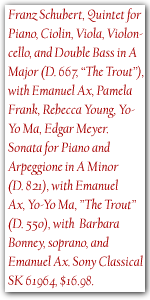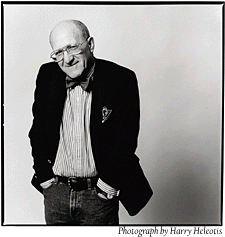Main Menu · Search ·Current Issue ·Contact ·Archives ·Centennial ·Letters to the Editor ·FAQs
| Unbounded Aspirations | Films: The West |
| Music: Trout, Enjoying Opera | Chapter & Verse |
| Off the Shelf | Open Book |

Cellist Yo-Yo Ma '76, D.Mus. '91, has long been one of the best known musical members of the Harvard community for his performances and recordings of the concerto repertoire. Here he has brought together eminent colleagues to present two of the most loved of Schubert's chamber works. Annotator Mark Salzman draws an analogy to basketball's Dream Team-unnecessary hyperbole for superb performances which should find an audience without it.
Most prominent of Ma's fellow stars is pianist Emanuel Ax, prolific in the recording studio. Violinist Pamela Frank has recorded Beethoven for Musicmasters, Schubert for Sony, and contemporary composer Aaron Jay Kernis for Argo. Bassist Edgar Meyer has recorded a variety of jazz outings for Windham Hill and MCA. Violist Rebecca Young seems to be new to discs. Together they produce a delightful "Trout."
The quintet includes a set of variations on Schubert's early song by that name as its fourth movement, and, rather untypically, includes a double bass as the fourth string instrument. The piano and violin parts are first among equals here; Ax shines with crystalline passagework and unforced beauty of tone, no matter what the dynamic level, and Frank produces a lovely sweet cantabile. The inner parts sparkle, and Meyer provides a warm foundation.
 The "Arpeggione" sonata survives as part of the active repertory only in transcription. Here it is rendered (and how!) on violoncello. Schubert wrote the work for the arpeggione or bowed guitar, an instrument invented by the Viennese Johann Georg Staufer in 1823, but belonging to the older tradition of the baryton, that late member of the gamba family for which Haydn wrote so many works. Both the arpeggione and the baryton shared a fretted fingerboard and tuning in fourths and a third. Schubert's creation for the instrument is entrancing, elegiac, and bittersweet, with the focus almost exclusively on the melody instrument. Ma has found a special tone for his cello in this work, capturing its essential melancholy.
The "Arpeggione" sonata survives as part of the active repertory only in transcription. Here it is rendered (and how!) on violoncello. Schubert wrote the work for the arpeggione or bowed guitar, an instrument invented by the Viennese Johann Georg Staufer in 1823, but belonging to the older tradition of the baryton, that late member of the gamba family for which Haydn wrote so many works. Both the arpeggione and the baryton shared a fretted fingerboard and tuning in fourths and a third. Schubert's creation for the instrument is entrancing, elegiac, and bittersweet, with the focus almost exclusively on the melody instrument. Ma has found a special tone for his cello in this work, capturing its essential melancholy.
 Of the various genres belonging to the Western musical tradition, grand opera is perhaps the most foreign to English-speaking listeners. Practically every European nation gave high priority to establishing an operatic tradition in its own tongue. England, alas, was the exception. After some promising beginnings in Purcell's time, foreign-language opera took over with Handel's advent, and has held sway ever since. Any works in the vernacular are doomed to be considered frivolous-not in the same league with the imported product. All this means that most American operagoers, unlike their counterparts in other lands, are expected to appreciate the beauties of the operatic repertory only through a glass, darkly.
Of the various genres belonging to the Western musical tradition, grand opera is perhaps the most foreign to English-speaking listeners. Practically every European nation gave high priority to establishing an operatic tradition in its own tongue. England, alas, was the exception. After some promising beginnings in Purcell's time, foreign-language opera took over with Handel's advent, and has held sway ever since. Any works in the vernacular are doomed to be considered frivolous-not in the same league with the imported product. All this means that most American operagoers, unlike their counterparts in other lands, are expected to appreciate the beauties of the operatic repertory only through a glass, darkly.